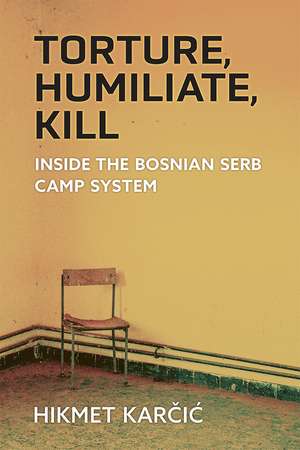Torture, Humiliate, Kill: Inside the Bosnian Serb Camp System: Ethnic Conflict: Studies in Nationality, Race, and Culture
Autor Hikmet Karcicen Limba Engleză Hardback – 25 mar 2022
Torture, Humiliate, Kill develops the author’s collective traumatization theory, which contends that the concentration camps set up by the Bosnian Serb authorities had the primary purpose of inflicting collective trauma on the non-Serb population of Bosnia and Herzegovina. This collective traumatization consisted of excessive use of torture, sexual abuse, humiliation, and killing. The physical and psychological suffering imposed by these methods were seen as a quick and efficient means to establish the Serb “living space.” Karčić argues that this trauma was deliberately intended to deter non-Serbs from ever returning to their pre-war homes. The book centers on multiple examples of experiences at concentration camps in four towns operated by Bosnian Serbs during the war: Prijedor, Bijeljina, Višegrad, and Bileća. Chosen according to their political and geographical position, Karčić demonstrates that these camps were used as tools for the ethno-religious genocidal campaign against non-Serbs. Torture, Humiliate, Kill is a thorough and definitive resource for understanding the function and operation of camps during the Bosnian genocide.
Preț: 508.18 lei
Preț vechi: 627.38 lei
-19% Nou
Puncte Express: 762
Preț estimativ în valută:
97.24€ • 101.80$ • 80.46£
97.24€ • 101.80$ • 80.46£
Carte indisponibilă temporar
Doresc să fiu notificat când acest titlu va fi disponibil:
Se trimite...
Preluare comenzi: 021 569.72.76
Specificații
ISBN-13: 9780472132966
ISBN-10: 0472132962
Pagini: 276
Ilustrații: 13 photos, 4 charts
Dimensiuni: 152 x 229 x 15 mm
Greutate: 0.48 kg
Editura: UNIVERSITY OF MICHIGAN PRESS
Colecția University of Michigan Press
Seria Ethnic Conflict: Studies in Nationality, Race, and Culture
ISBN-10: 0472132962
Pagini: 276
Ilustrații: 13 photos, 4 charts
Dimensiuni: 152 x 229 x 15 mm
Greutate: 0.48 kg
Editura: UNIVERSITY OF MICHIGAN PRESS
Colecția University of Michigan Press
Seria Ethnic Conflict: Studies in Nationality, Race, and Culture
Notă biografică
Hikmet Karčić is a genocide and Holocaust scholar based in Sarajevo, Bosnia and Herzegovina. He was the 2017 Auschwitz Institute-Keene State College Global Fellow who has written extensively on genocide denial and atrocity prevention. A sought after commentator on international media outlets, his articles covering far-right extremism and mass atrocities have appeared in Haaretz, Newsweek and Foreign Policy.
Cuprins
LIST OF ABBREVIATIONS
LIST OF ILLUSTRATIONS
INTRODUCTION
CHAPTER 1: HISTORY OF ETHNIC RELATIONS IN BOSNIA AND HERZEGOVINA
CHAPTER 2: COLLECTIVE TRAUMATIZATION
CHAPTER 3: VIŠEGRAD
CHAPTER 4: PRIJEDOR
CHAPTER 5: BIJELJINA
CHAPTER 6: BILEĆA
CHAPTER 7: CONCLUSIONS
REFERENCES
LIST OF ILLUSTRATIONS
INTRODUCTION
CHAPTER 1: HISTORY OF ETHNIC RELATIONS IN BOSNIA AND HERZEGOVINA
CHAPTER 2: COLLECTIVE TRAUMATIZATION
CHAPTER 3: VIŠEGRAD
CHAPTER 4: PRIJEDOR
CHAPTER 5: BIJELJINA
CHAPTER 6: BILEĆA
CHAPTER 7: CONCLUSIONS
REFERENCES
Recenzii
“Torture, Humiliate, Kill is a masterfully written and meticulously researched monograph about the Serb-run concertation camps during the 1992–95 Bosnian War. This groundbreaking book represents both a tribute to the victims and an essential reference for understanding the genocidal intent of the systematic violence by the Serb military against the Bosniak population.”
" The book is impressive, providing the reader with a strong, critical analysis of the Bosnian Serb camp system as it operated...Torture, Humiliate, Kill is a crucial contribution to the scholarly canon, highlighting the under-researched and underacknowledged Bosnian Serb camp system."
"In a deliberate, and perhaps controversial, intervention for studies of mass violence and genocide, Karčić systematically names both the victims and the perpetrators. In doing so, he argues, scholars can take an important step to counter genocide: "the names of those killed that fill...[the book]...were supposed to be erase forever--that is the point of genocide--but here their tragic stories are shared, and the memory of what happened to them, and who did it, are preserved."
" The book is impressive, providing the reader with a strong, critical analysis of the Bosnian Serb camp system as it operated...Torture, Humiliate, Kill is a crucial contribution to the scholarly canon, highlighting the under-researched and underacknowledged Bosnian Serb camp system."
"In a deliberate, and perhaps controversial, intervention for studies of mass violence and genocide, Karčić systematically names both the victims and the perpetrators. In doing so, he argues, scholars can take an important step to counter genocide: "the names of those killed that fill...[the book]...were supposed to be erase forever--that is the point of genocide--but here their tragic stories are shared, and the memory of what happened to them, and who did it, are preserved."
Descriere
Detention camps as instruments of torture and collective trauma




